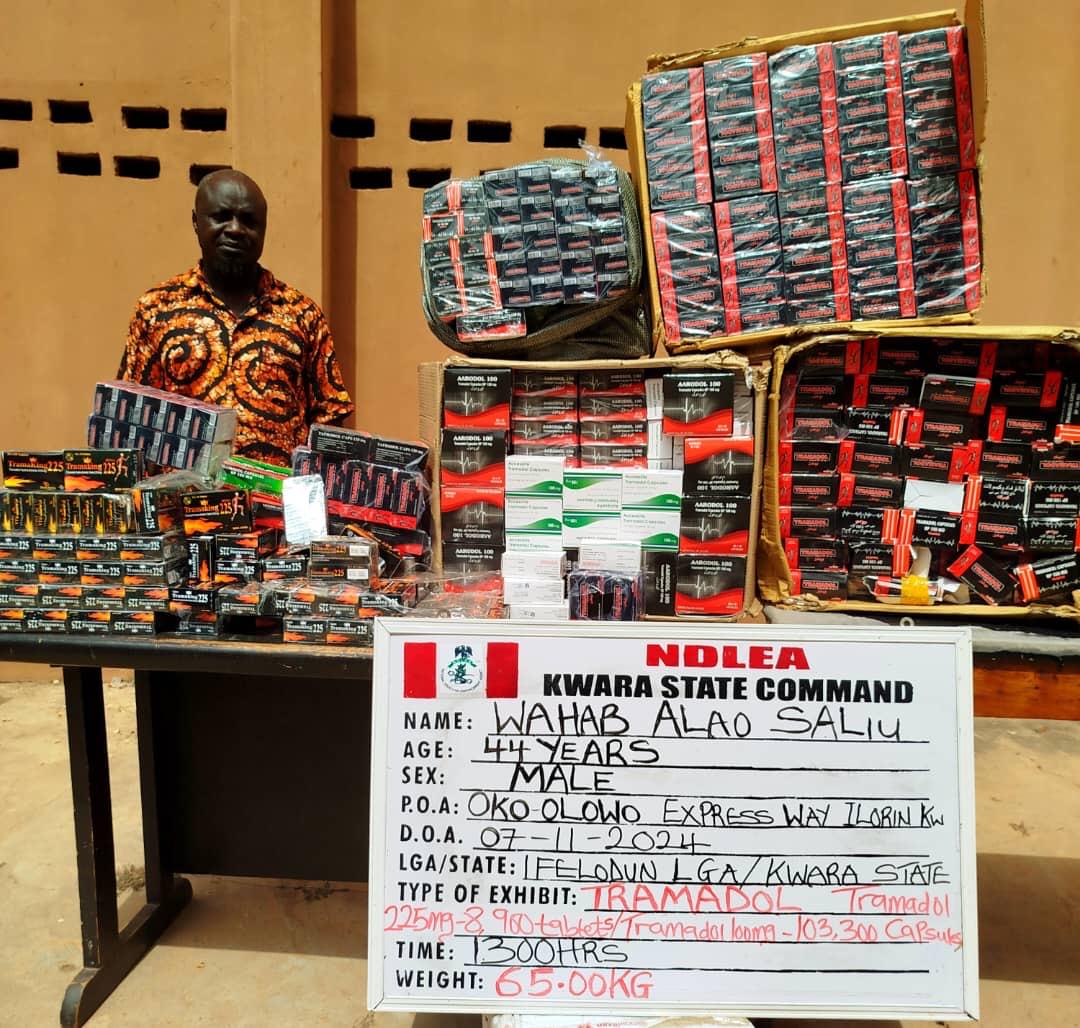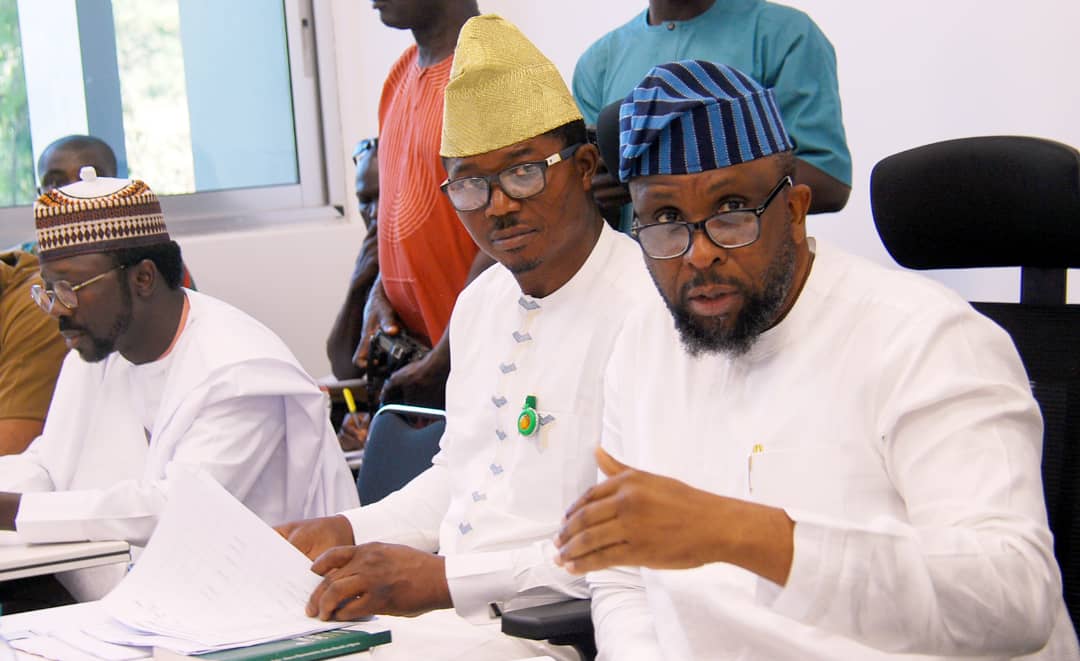News
NDLEA smashes cross-border drug syndicates, nabs 6 kingpins, recovers cocaine, opioids(Photos)

By Kayode Sanni-Arewa
. Lekki software engineer, Chadian, others nabbed over tons of illicit drugs seized in Lagos, FCT, Taraba, Kwara, Plateau, Kano, Kaduna, Edo, Ondo
After months of intelligence gathering and painstaking surveillance, operatives of the National Drug Law Enforcement Agency, NDLEA, have smashed two major cross-border drug trafficking syndicates with cocaine and opioids worth billions of naira recovered from them while six leaders of the cartels were arrested in different parts of the country.
The syndicates, which comprise Nigerians based in Mubi, Adamawa state; Onitsha, Anambra state, and Lagos state as well as Cameroonians came under NDLEA radar after they were suspected of being major suppliers of drugs to terror groups operating in Nigeria and Cameroon.
Leaders of the syndicates so far arrested include: Ibrahim Bawuro, Najib Ibrahim, Ibrahim Umar, Nelson Udechukwu Anayo, Ezeh Amaechi Martin and Adejumo Elijah Ishola.
Intelligence gathered revealed that some psychoactive substances including tramadol were often sourced by Ibrahim Bawuro and Ibrahim Najib from a notorious drug dealer in Onitsha: Nelson Udechukwu Anayo and thereafter packed and concealed in vehicles in the premises of Ezeh Amaechi Martin, an associate of Udechukwu.
The duo of Ibrahim Bawuro and Ibrahim Najib will thereafter transport the drugs from Onitsha to Yola and subsequently to other parts of the North and Cameroon in specially constructed false compartments of vehicles, which travel from the East to the North at night. On 7th October 2024, Bawuro and Najib were trailed from Onitsha where they had gone to buy another consignment and eventually arrested in Taraba the following day 8th October while a total of 276,500 pills of tramadol were recovered from a Toyota Avensis saloon car marked DKA 57 TT, which they abandoned on the Jalingo-Yola expressway when they noticed NDLEA operatives were on their trail.
Follow up operations were subsequently carried out in Delta and Anambra states where Ezeh Amaechi Martin and Udechukwu Nelson Anayo were arrested by operatives of the NDLEA Directorate of Intelligence, which coordinated the whole effort with their counterparts in Taraba, Adamawa, Delta and Anambra.
Another leader of a different syndicate, Adejumo Elijah Ishola, 37, was arrested by operatives of a special operation unit of the Agency on Tuesday 5th November at Seme border in Lagos on his way from Ghana with 3.3 kilograms of cocaine and 600grams of synthetic cannabis. This followed months of intelligence and surveillance on his cross-border criminal activities.
Meanwhile, NDLEA operatives in Apapa seaport Lagos on Wednesday 6th November intercepted Thirty-One Million, Seven Hundred and Fifty Thousand (31,750,000) pills of 240mg Voltron, a controlled opioid, packaged and concealed in a container imported from India, as diclofenac sodium 100mg tablets.
The discovery was made during a joint examination of the container with men of Customs Service and other security agencies.
At the Murtala Muhammed International Airport, MMIA, import shed Ikeja Lagos, NDLEA officers on Tuesday 5th November intercepted a 700grams consignment of Loud, a strong strain of cannabis.
A software engineer, Olu Marshal who showed up to collect the package was promptly arrested and a follow up search of his home in Lekki led to the recovery of some drug paraphernalia, including a cannabis crusher.
Attempt by another suspect, Orji Ogbonna Nnaorji to send 32.50kg bottles of codeine syrup and 5.70kg cannabis to London, UK, concealed in tiger nuts cargo through the export shed of the Lagos airport was frustrated by NDLEA operatives on Friday 8th November.
A follow up operation led to the arrest of Orji at his warehouse in Ajao estate, Lagos.
In Kwara state, not less than 162,800 pills of opioids were seized by NDLEA operatives from four suspects during interdiction operations in parts of the state.
While 112,200 tablets of tramadol were recovered from Wahab Alao Saliu, 18,900 tablets of same opioid were recovered from Dalha Musa both at Eiyenkorin area of Ilorin; 29,000 pills of tramadol, 200 ampoules of diazepam and 99 bottles of codeine syrup seized from Ahmed Isiaka, just as 2,500 tabs of tramadol were seized from Ahmed Garba, both at Bode Saadu in Moro local government area of the state on Friday 8th November.
In Abuja, NDLEA operatives in the Federal Capital Territory on Thursday 7th November intercepted a truck along Abaji- Kwali road with 755.50kg cannabis concealed under empty cartons of noodles.
The truck driver, Lukman Rasheed, 41, claimed that bags of the psychoactive substance were loaded into the trailer in Ogbese, Ondo state after departing Lagos with only empty cartons of noodles.
A suspect, Yusuf Abubakar, 43, was arrested by operatives on Monday 4th November at Ibi, Taraba state while conveying to Kano 361 compressed blocks of cannabis weighing 156.95kg in a commercial bus marked WKR 772 XA. Not less than 245 blocks of same substance with a total weight of 121kg were recovered by NDLEA officers on patrol along Wukari – Ibi road on Thursday 7th November.
Two suspects: Hamza Yakubu, 30, and Abdulra’uf Danjuma, 23, were on Wednesday 6th November arrested at Gidan Manjagab area of Jos, Plateau state with 113 blocks of cannabis sativa weighing 141kg, while a Chadian, Hassan Muhammad Ali, 31, was nabbed on Tuesday 5th November at Gadar Tamburawa, Zaria-Kano road, Kano, with 3,000 pills of tramadol 225mg.
While a suspect Ibrahim Adamu was arrested at Jere area of Kaduna state with 35 sacks of cannabis sativa weighing 338.8 kilograms, NDLEA operatives in Edo state on Friday 8th November recovered 1,078kg cannabis at Okhuokhuo – Isi forest and 228kg of same substance at Sabo- Auchi.
In Ondo state, four suspects: Friday Daniel, Patrick Felix, Samuel Agada and Igwe Chukwuka were arrested at Emure Ile with 672kg cannabis sativa, while 513kg of same substance was seized at Gbodo camp, Ikun Akoko and a total of 4, 908kg cannabis recovered from a suspect Musibau Kosama at Alabi Yellow, Ijoka area of Akure on Wednesday 6th November.
Across the country, NDLEA Commands continued their War Against Drug Abuse, WADA, sensitization lectures and advocacy visits to worship centres, schools, workplaces, palaces of traditional rulers and communities all through the past week.
Instances include: WADA sensitization lecture to students and staff of Park Royal College, Apapa Lagos; Government Secondary School, Atu, Cross River; Ladigbolu Grammar School 2, Oyo, Oyo state; Iman Secondary School, Arkilla, Sokoto; Rosary Girls College, Nise, Anambra; Havilah Gold Secondary School, Odomola, Epe, Lagos state; while the Edo State command of NDLEA paid a WADA advocacy visit to HRM Oba of Benin, Omo N’Oba N’Edo, Uku Akpolokpolo Oba Ewuare II, among others.
While commending the officers and men of DI, SIU, Apapa, MMIA, FCT, Taraba, Kwara, Plateau, Kano, Kaduna, Edo, and Ondo Commands of the Agency for the arrests and seizures of the past week, Chairman/Chief Executive Officer of NDLEA, Brig. Gen. Mohamed Buba Marwa (Rtd) also applauded their compatriots in all the commands across the country for intensifying the WADA sensitization lectures and advocacy messages to every part of their areas of responsibility.





News
See Photos of World’s Tallest and Shortest Women Meet for Afternoon Tea in London

The world’s tallest woman and the world’s shortest woman met for the first time this week, sipping tea from china cups — and bonding over what they have in common while celebrating their differences.

Jyoti Amge, shortest woman, and Rumeysa Gelgi, tallest woman, meet for the first time and share afternoon tea
Jyoti Amge, shortest woman, and Rumeysa Gelgi, tallest woman, meet for the first time and share afternoon tea

Jyoti Amge, shortest woman, and Rumeysa Gelgi, tallest woman, meet for the first time and share afternoon tea
Rumeysa Gelgi, from Turkey, stands at 7 feet and 0.7 inches, while Jyoti Amge, from India, is 2 feet and 0.7 inches.
Jyoti Amge, shortest woman, and Rumeysa Gelgi, tallest woman, meet for the first time and share afternoon tea

Jyoti Amge, shortest woman, and Rumeysa Gelgi, tallest woman, meet for the first time and share afternoon tea
Jyoti Amge, shortest woman, and Rumeysa Gelgi, tallest woman, meet for the first time and share afternoon tea
Jyoti Amge, shortest woman, and Rumeysa Gelgi, tallest woman, meet for the first time and share afternoon tea

Jyoti Amge, shortest woman, and Rumeysa Gelgi, tallest woman, meet for the first time and share afternoon tea
“You’re so beautiful,” said Gelgi, 27. “Thank you — you too,” replied Amge, 30.
Their meeting, over afternoon tea at London’s Savoy Hotel on Tuesday, came ahead of Guinness World Records Day, which is held annually in November to mark record-breaking achievements and encourage people to attempt records. The pair have been honored as “World Record icons” in the 70th anniversary edition of the Guinness World Records book.
Story continues below advertisement
“Meeting Jyoti for the first time was wonderful,” Gelgi said in a release Wednesday. “She’s the most gorgeous lady. I was waiting to meet her for a long time.”
Gelgi said the pair bonded over their love for makeup, jewelry and doing their nails.
Video footage showed them sitting down for tea, cakes and sandwiches stacked next to them, with the London Eye visible from the window.
Amge said in the release that she was “so happy to look up” and see the world’s tallest woman, whom she called “good-natured.” She added that it was difficult at times for the pair to make eye contact “due to our height difference.”
“Guinness World Records is all about celebrating differences,” its editor in chief, Craig Glenday, said in a statement ahead of Guinness World Record Day, which is on Thursday.
“By bringing together these two amazing, iconic women, they can share their perspectives on life with each other and, also, with us,” Glenday said.
Gelgi’s record-breaking height is due to a rare genetic condition called Weaver syndrome, which causes rapid growth, according to the National Organization for Rare Disorders.
Story continues below advertisement
The primary symptom is growth and bone development that occurs faster than usual, making those affected taller than average. People with Weaver syndrome may have rigid muscles and difficulty extending their elbows or knees.
Gelgi used a walking aid for support during the pair’s meeting. Her case of Weaver syndrome was the 27th ever diagnosed and the first in Turkey, according to Guinness World Records.
Weaver syndrome is generally caused by changes in the EZH2 gene, according to the NORD, though the organization notes that some people with Weaver syndrome do not have a mutation in the gene.
Story continues below advertisement
Amge, an actor who played the character of Ma Petite in the television series “American Horror Story,” has a genetic growth disorder that occurs in the early stages of fetal development, known as achondroplasia.
According to Johns Hopkins, the condition causes shorter bones, abnormally shaped bones and shorter stature. While the genetic defect can be passed from parent to child, in about 80 percent of cases, achondroplasia results from a spontaneous mutation that occurs in the developing embryo.
On Thursday, Gelgi shared photos on Instagram of the two exploring London despite the cold weather, posing side by side in front of Tower Bridge.
News
Speaker Abbas Decries Gross Inadequacy In Health Sector Despite Annual Allocation

News
Reps Demand Details Of Project Undertaken From Ministry Of Solid Minerals In 2024 Budget

-

 News18 hours ago
News18 hours agoDHQ Gives Updates on on Arrest, Trial of Simon Ekpa in Finland
-

 News18 hours ago
News18 hours agoJapa: 1 of 4 Nigerians want to leave the country – NBS
-

 News17 hours ago
News17 hours agoSenate mandates military to free LGs under B’Haram control
-

 News17 hours ago
News17 hours agoOUTREACH: Senator Manu concludes 2-day ICT program for constituents, distributes over 500 laptops to students (Video/Photos)
-

 News17 hours ago
News17 hours ago2027: Obasanjo’s knock on INEC reopens push for electoral reform
-

 News18 hours ago
News18 hours agoSimon Ekpa Sent To Prison
-

 News18 hours ago
News18 hours agoI’m not too young or inexperienced to run for Lagos Governor – Speaker Obasa
-

 News18 hours ago
News18 hours agoNigerian Catholic religious Sister Uti wins $1.2 million Opus Prize








